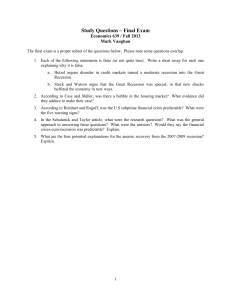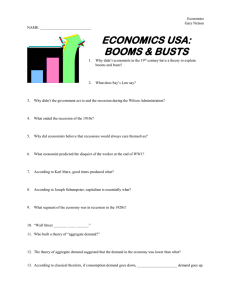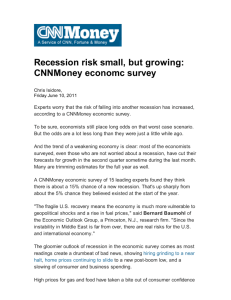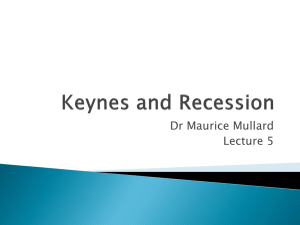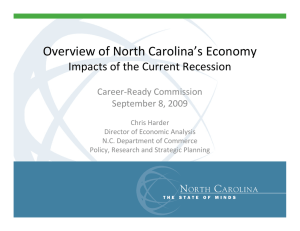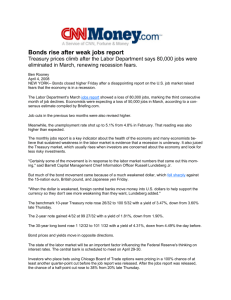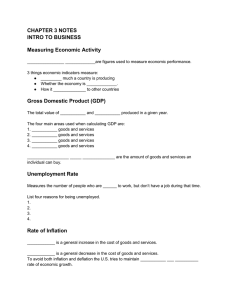NYT, The World's Economies Slide Together Into Recession 11/25/01: A6... WASHINGTON, Nov. 22 - With American economic malaise spreading as... technology- driven surge that preceded it, many economists now agree...
advertisement
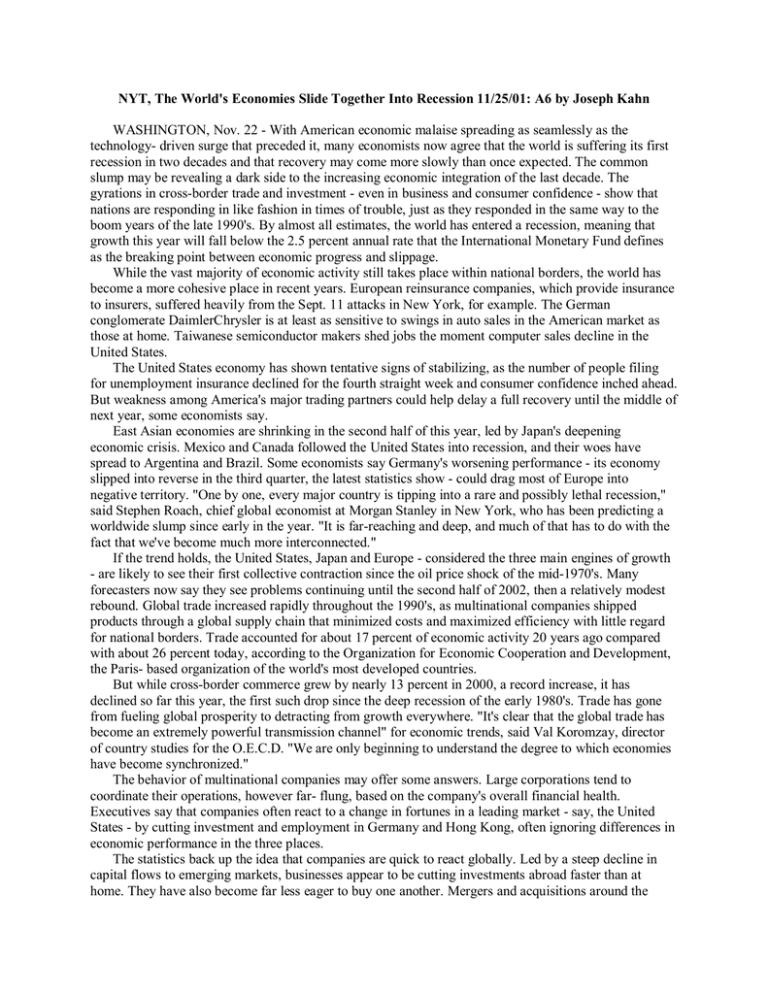
NYT, The World's Economies Slide Together Into Recession 11/25/01: A6 by Joseph Kahn WASHINGTON, Nov. 22 - With American economic malaise spreading as seamlessly as the technology- driven surge that preceded it, many economists now agree that the world is suffering its first recession in two decades and that recovery may come more slowly than once expected. The common slump may be revealing a dark side to the increasing economic integration of the last decade. The gyrations in cross-border trade and investment - even in business and consumer confidence - show that nations are responding in like fashion in times of trouble, just as they responded in the same way to the boom years of the late 1990's. By almost all estimates, the world has entered a recession, meaning that growth this year will fall below the 2.5 percent annual rate that the International Monetary Fund defines as the breaking point between economic progress and slippage. While the vast majority of economic activity still takes place within national borders, the world has become a more cohesive place in recent years. European reinsurance companies, which provide insurance to insurers, suffered heavily from the Sept. 11 attacks in New York, for example. The German conglomerate DaimlerChrysler is at least as sensitive to swings in auto sales in the American market as those at home. Taiwanese semiconductor makers shed jobs the moment computer sales decline in the United States. The United States economy has shown tentative signs of stabilizing, as the number of people filing for unemployment insurance declined for the fourth straight week and consumer confidence inched ahead. But weakness among America's major trading partners could help delay a full recovery until the middle of next year, some economists say. East Asian economies are shrinking in the second half of this year, led by Japan's deepening economic crisis. Mexico and Canada followed the United States into recession, and their woes have spread to Argentina and Brazil. Some economists say Germany's worsening performance - its economy slipped into reverse in the third quarter, the latest statistics show - could drag most of Europe into negative territory. "One by one, every major country is tipping into a rare and possibly lethal recession," said Stephen Roach, chief global economist at Morgan Stanley in New York, who has been predicting a worldwide slump since early in the year. "It is far-reaching and deep, and much of that has to do with the fact that we've become much more interconnected." If the trend holds, the United States, Japan and Europe - considered the three main engines of growth - are likely to see their first collective contraction since the oil price shock of the mid-1970's. Many forecasters now say they see problems continuing until the second half of 2002, then a relatively modest rebound. Global trade increased rapidly throughout the 1990's, as multinational companies shipped products through a global supply chain that minimized costs and maximized efficiency with little regard for national borders. Trade accounted for about 17 percent of economic activity 20 years ago compared with about 26 percent today, according to the Organization for Economic Cooperation and Development, the Paris- based organization of the world's most developed countries. But while cross-border commerce grew by nearly 13 percent in 2000, a record increase, it has declined so far this year, the first such drop since the deep recession of the early 1980's. Trade has gone from fueling global prosperity to detracting from growth everywhere. "It's clear that the global trade has become an extremely powerful transmission channel" for economic trends, said Val Koromzay, director of country studies for the O.E.C.D. "We are only beginning to understand the degree to which economies have become synchronized." The behavior of multinational companies may offer some answers. Large corporations tend to coordinate their operations, however far- flung, based on the company's overall financial health. Executives say that companies often react to a change in fortunes in a leading market - say, the United States - by cutting investment and employment in Germany and Hong Kong, often ignoring differences in economic performance in the three places. The statistics back up the idea that companies are quick to react globally. Led by a steep decline in capital flows to emerging markets, businesses appear to be cutting investments abroad faster than at home. They have also become far less eager to buy one another. Mergers and acquisitions around the world are off 55 percent so far this year compared with 2000, according to Morgan Stanley. That is a sharp contrast to the milder recession of the early 1990's, when Japanese companies were still expanding rapidly in the United States, Europe and Southeast Asia. Partly because no major economy has managed to stay vibrant, the Organization for Economic Cooperation and Development reported this week that its 30 member nations would probably experience reduced output in the second half of this year. It also reduced its growth forecast for next year by twothirds, to 1 percent from almost 3 percent. The worldwide downturn gives some ammunition to critics of global integration, many of whom have argued that the trend toward corporate expansion and unfettered flow of goods and money will not foster sustained prosperity. Nations that enthusiastically courted foreign multinational investment and followed American advice to keep their markets open and their currencies freely convertible have suffered most. Singapore, Taiwan, Mexico and Argentina are among the nations that were considered economic models in the late 1990's that are now experiencing deep recessions. China, Russia and India have tended to move more slowly toward integrating themselves into the global economy, and they have suffered much less in recent months. On the other hand, the fact that a decline in trade and investment appears to have had a pronounced drag on global growth suggests that the above-average expansion of the late 1990's had more to do with rapid integration than critics acknowledged at the time. "There is an underlying trend toward more synchronization" that accounts, at least in part, for today's broad downturn, said Kenneth Rogoff, chief economist of the International Monetary Fund. But he said that the same forces would raise average growth rates over the long haul. "There's no question that we would be worse off without it," Mr. Rogoff said. While most economists agree that that nations should integrate more, many say the risks are also becoming clearer. Investors who bought surging Internet stocks a few years ago thought they had the potential to earn extraordinary returns, but they suffered unusually steep losses. Nations can also follow the herd. The clearest sign of that is the technology boom, which gripped Finland, Israel, Hong Kong and Chile with the same fervor it excited in the United States. The collapse of the Nasdaq became a common shock - not unlike the oil shock of the 1970's - that punished risk-takers everywhere. Porous borders and open competition have also proven to be a double- edged sword. Prices of the most highly traded goods have been in general decline for several years. That has generally been good news for consumers. But it has left businesses struggling to earn reliable profits on both commodities and manufactured goods. With the notable exception of oil, which does not respond freely to market forces, prices of commodities like coffee and copper, as well as simple manufactured goods like clothing and shoes, and some highly traded industrial goods like steel, have been slipping steadily. This deflation has already overtaken Japan and other Asian nations. It is lapping the shores of the United States and Europe. While few expect lasting deflation in this country, the United States has begun to see at least a temporary fall in prices. The American producer price index declined at a 1.6 percent rate last month, its steepest drop in many years. Consumer prices also slipped in October. Falling prices tend to discourage economic activity because businesses see less likelihood of earning high returns if they have to cut prices. Consumers defer purchases if they think they may be able to buy the same item for less in the future. Ultimately, economics can be a self-fulfilling prophecy. The world is unlikely to fall into a deflationary spiral unless people believe that will happen. But even psychology can be borderless. While the Bush administration is worried about how Americans and Arabs are getting divergent information about the war in Afghanistan, economists are more focused on the fact that the vast majority of people around the world get roughly the same take on events. French, Spanish, Thai and Korean people have reacted in much the same way to the attacks of Sept. 11. Air travel and tourism are down everywhere. Mr. Rogoff said he saw a high correlation between business and consumer sentiment across the world that might sway economic performance even more than other common links, like trade and finance. "One reason we have become more synchronized," he said, "is because we're all watching CNN."
